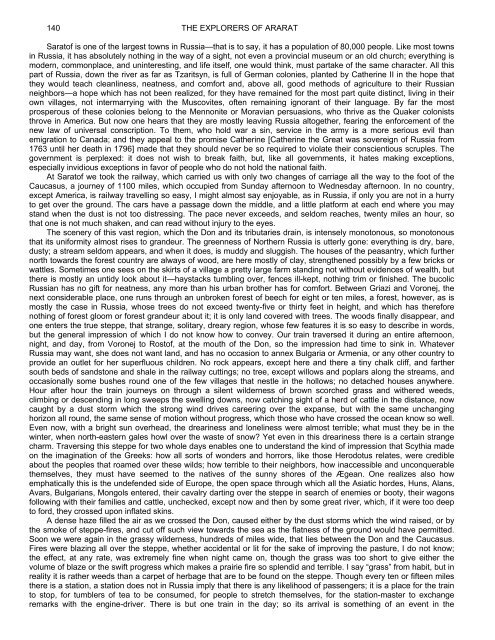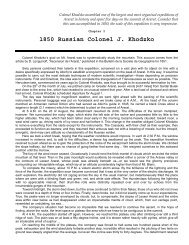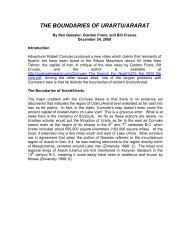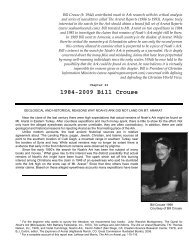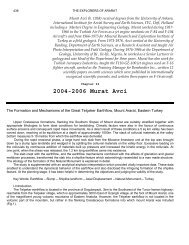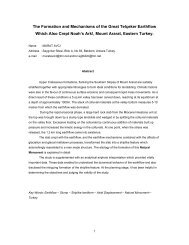1876 British Viscount & Ambassador James Bryce - Noah's Ark Search
1876 British Viscount & Ambassador James Bryce - Noah's Ark Search
1876 British Viscount & Ambassador James Bryce - Noah's Ark Search
Create successful ePaper yourself
Turn your PDF publications into a flip-book with our unique Google optimized e-Paper software.
140 THE EXPLORERS OF ARARAT<br />
Saratof is one of the largest towns in Russia—that is to say, it has a population of 80,000 people. Like most towns<br />
in Russia, it has absolutely nothing in the way of a sight, not even a provincial museum or an old church; everything is<br />
modern, commonplace, and uninteresting, and life itself, one would think, must partake of the same character. All this<br />
part of Russia, down the river as far as Tzaritsyn, is full of German colonies, planted by Catherine II in the hope that<br />
they would teach cleanliness, neatness, and comfort and, above all, good methods of agriculture to their Russian<br />
neighbors—a hope which has not been realized, for they have remained for the most part quite distinct, living in their<br />
own villages, not intermarrying with the Muscovites, often remaining ignorant of their language. By far the most<br />
prosperous of these colonies belong to the Mennonite or Moravian persuasions, who thrive as the Quaker colonists<br />
throve in America. But now one hears that they are mostly leaving Russia altogether, fearing the enforcement of the<br />
new law of universal conscription. To them, who hold war a sin, service in the army is a more serious evil than<br />
emigration to Canada; and they appeal to the promise Catherine [Catherine the Great was sovereign of Russia from<br />
1763 until her death in 1796] made that they should never be so required to violate their conscientious scruples. The<br />
government is perplexed: it does not wish to break faith, but, like all governments, it hates making exceptions,<br />
especially invidious exceptions in favor of people who do not hold the national faith.<br />
At Saratof we took the railway, which carried us with only two changes of carriage all the way to the foot of the<br />
Caucasus, a journey of 1100 miles, which occupied from Sunday afternoon to Wednesday afternoon. In no country,<br />
except America, is railway travelling so easy, I might almost say enjoyable, as in Russia, if only you are not in a hurry<br />
to get over the ground. The cars have a passage down the middle, and a little platform at each end where you may<br />
stand when the dust is not too distressing. The pace never exceeds, and seldom reaches, twenty miles an hour, so<br />
that one is not much shaken, and can read without injury to the eyes.<br />
The scenery of this vast region, which the Don and its tributaries drain, is intensely monotonous, so monotonous<br />
that its uniformity almost rises to grandeur. The greenness of Northern Russia is utterly gone: everything is dry, bare,<br />
dusty; a stream seldom appears, and when it does, is muddy and sluggish. The houses of the peasantry, which further<br />
north towards the forest country are always of wood, are here mostly of clay, strengthened possibly by a few bricks or<br />
wattles. Sometimes one sees on the skirts of a village a pretty large farm standing not without evidences of wealth, but<br />
there is mostly an untidy look about it—haystacks tumbling over, fences ill-kept, nothing trim or finished. The bucolic<br />
Russian has no gift for neatness, any more than his urban brother has for comfort. Between Griazi and Voronej, the<br />
next considerable place, one runs through an unbroken forest of beech for eight or ten miles, a forest, however, as is<br />
mostly the case in Russia, whose trees do not exceed twenty-five or thirty feet in height, and which has therefore<br />
nothing of forest gloom or forest grandeur about it; it is only land covered with trees. The woods finally disappear, and<br />
one enters the true steppe, that strange, solitary, dreary region, whose few features it is so easy to describe in words,<br />
but the general impression of which I do not know how to convey. Our train traversed it during an entire afternoon,<br />
night, and day, from Voronej to Rostof, at the mouth of the Don, so the impression had time to sink in. Whatever<br />
Russia may want, she does not want land, and has no occasion to annex Bulgaria or Armenia, or any other country to<br />
provide an outlet for her superfluous children. No rock appears, except here and there a tiny chalk cliff, and farther<br />
south beds of sandstone and shale in the railway cuttings; no tree, except willows and poplars along the streams, and<br />
occasionally some bushes round one of the few villages that nestle in the hollows; no detached houses anywhere.<br />
Hour after hour the train journeys on through a silent wilderness of brown scorched grass and withered weeds,<br />
climbing or descending in long sweeps the swelling downs, now catching sight of a herd of cattle in the distance, now<br />
caught by a dust storm which the strong wind drives careering over the expanse, but with the same unchanging<br />
horizon all round, the same sense of motion without progress, which those who have crossed the ocean know so well.<br />
Even now, with a bright sun overhead, the dreariness and loneliness were almost terrible; what must they be in the<br />
winter, when north-eastern gales howl over the waste of snow? Yet even in this dreariness there is a certain strange<br />
charm. Traversing this steppe for two whole days enables one to understand the kind of impression that Scythia made<br />
on the imagination of the Greeks: how all sorts of wonders and horrors, like those Herodotus relates, were credible<br />
about the peoples that roamed over these wilds; how terrible to their neighbors, how inaccessible and unconquerable<br />
themselves, they must have seemed to the natives of the sunny shores of the Ægean. One realizes also how<br />
emphatically this is the undefended side of Europe, the open space through which all the Asiatic hordes, Huns, Alans,<br />
Avars, Bulgarians, Mongols entered, their cavalry darting over the steppe in search of enemies or booty, their wagons<br />
following with their families and cattle, unchecked, except now and then by some great river, which, if it were too deep<br />
to ford, they crossed upon inflated skins.<br />
A dense haze filled the air as we crossed the Don, caused either by the dust storms which the wind raised, or by<br />
the smoke of steppe-fires, and cut off such view towards the sea as the flatness of the ground would have permitted.<br />
Soon we were again in the grassy wilderness, hundreds of miles wide, that lies between the Don and the Caucasus.<br />
Fires were blazing all over the steppe, whether accidental or lit for the sake of improving the pasture, I do not know;<br />
the effect, at any rate, was extremely fine when night came on, though the grass was too short to give either the<br />
volume of blaze or the swift progress which makes a prairie fire so splendid and terrible. I say “grass” from habit, but in<br />
reality it is rather weeds than a carpet of herbage that are to be found on the steppe. Though every ten or fifteen miles<br />
there is a station, a station does not in Russia imply that there is any likelihood of passengers; it is a place for the train<br />
to stop, for tumblers of tea to be consumed, for people to stretch themselves, for the station-master to exchange<br />
remarks with the engine-driver. There is but one train in the day; so its arrival is something of an event in the


